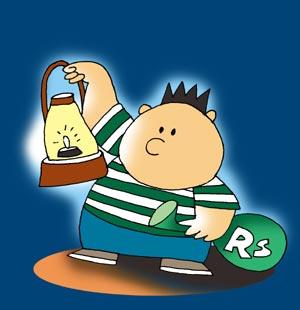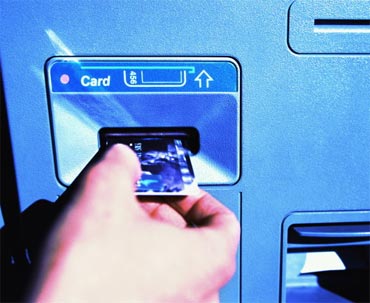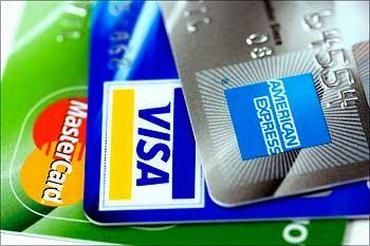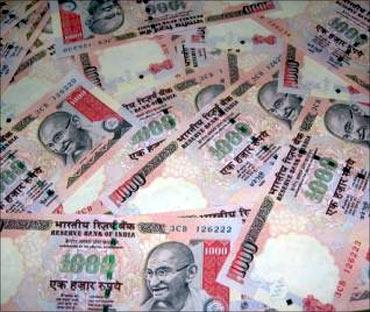Photographs: Rediff Archives Aditya Prasad, Perfios.com
James Frick was bang on when he said, "Don't tell me what your priorities are. Show me where you spend your money and I will tell you what they are"! We may value the presence of money in our lives but how we choose to spend it eventually determines whether the effort to earn it was worth it or not.
The importance of spending wisely cannot be undermined especially in times when there are temptations galore. Walk into a mall and how do you stop yourself from spending on a new gadget which you absolutely love but don't really need. Walk into a supermarket and on reaching the billing counter, realise you have well exceeded your budget but can't figure out how. While it is only human to splurge once in a while, lifestyle changes today have made these occasional urges, a more regular practice in the urban households. We are slowly moving away from the savings culture to the credit culture.
Consumer spending and credit growth is good for the economy but before you think macro, do consider the consequences of unabated spending on your household. This is not to say that all spending is bad. However, uncontrolled and unnecessary spending is bad and may come at the cost of your future goals. Remember that a rupee saved is rupee earned.
The objective of earning money is to lead a comfortable life, not just in the present but also in future, not just in your earning years but also in your retired life. Spending wisely would amount to increased savings because there are only two things you can do with your money; spend and save. While spending is important for a good life today, saving is important for a secure future tomorrow.
Here are some small changes that you can bring about in the way you use money which may help you curb impulsive spending and yet not make you feel as if you are restraining yourself.
The author is chief evangelist, Perfios
10 effective ways to spend less money
1. Save before you spend
A good practice is to save first and then spend. Set up your savings plan in such a way that money moves out of your account without your intervention. For example, set up an SIP in mutual fund with an ECS option. The money gets debited from your account and invested in the fund every month. If you choose a ULIP, go for a monthly or quarterly option with ECS. This has twin advantages, for one it ensures that you are saving as per your plan, for future goals and secondly, it lets you know what your spending should be restricted to.
2. Use debit card or cash for regular household expenses
Set up a budget for the household's non-discretionary expenses such as groceries, utilities etc. and refrain from using credit card for these expenses. There is always a tendency to spend more using the credit card but debit card or cash would restrict your spending to the amount available.
10 effective ways to spend less money
3. Use credit card judiciously
Set a monthly limit to your credit card spending and stick to it. This limit should not be the credit card limit but personal limit you put on your credit card spending. This may include shopping, eating out and entertainment. Also, restrict the number of cards to one or two. This can also help you accumulate points for your purchases on a single card rather than having them scattered across many. Points on credit card can be redeemed for shopping vouchers or gifts.
4. Pay your credit card bills on time
Credit card bills if delayed, lead to incurrence of late payment charges. Use a system that provides timely reminders of your payments. Perfios for example, helps you maintain a record of your credit cards and can be used to set up payment reminders before the due date.
10 effective ways to spend less money
5. Maintain budgets and track your expenses
This may the most boring thing to do but is the most crucial task in ensuring that you do not go overboard while spending. A budget helps you set limits and tracking your expenses keeps you in check. Perfios can be used to set up and track budgets for expenses under different heads; it allows you to record expenses which can then be compared with the budget to see if you overshot the budget.
6. Self-discipline
This is an essential component of a good financial life. Use money management software to make it a less cumbersome exercise. Use reports to analyse your spending patterns over different periods.
10 effective ways to spend less money
7. Always shop with a list in hand
Especially while shopping in a supermarket, prepare in advance a list of all the things that you need so that you don't end up picking up things which you don't need. The market place today is designed to encourage impulsive spending. Making a note of what you need discourages impulsive buying.
8. Plan for big-ticket expenses
Big ticket expenses such as vacations or purchase of consumer durables should be planned well in advance and not overnight. Start saving in advance towards these expenses with a budget in mind.
9. Use 'sale' time for discretionary purchases
Discount sales today are no longer an annual event but an almost round the year phenomenon. Postpone purchases to get a good deal during the sale period.
10. Invest in a good personal finance tool
Good money management software has become imperative today, as people do not find the time or the mind space to keep a track of their financial life. A small investment of time and money can ensure that you are tracking your investments, paying your bills on time, tracking your bank accounts, credit cards and expenses, paying premiums on time and the like. For instance, a tool like Perfios provides all these features and most of these are free for all users.
It is said that "to have money is good; to have control of money is better". Unnecessary expenses not only put your future goals at risk but also can lead you into a debt trap. A good life doesn't really come with unabashed spending but with self-control, discipline and respect for money.






Comment
article